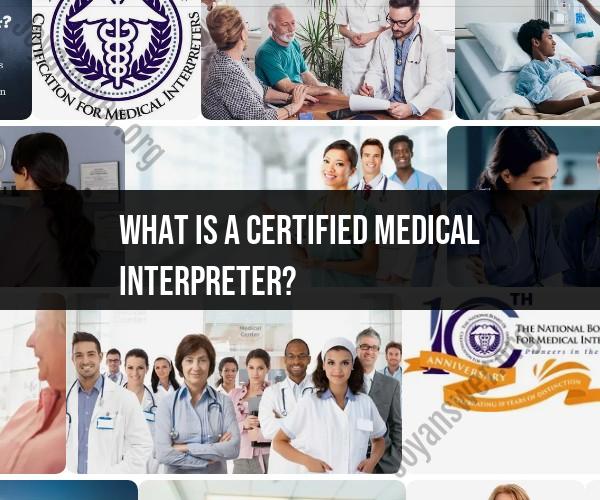What is a certified medical interpreter?
A certified medical interpreter is a professional language interpreter who specializes in providing accurate and effective communication between healthcare providers and patients who have limited English proficiency or speak a language other than the primary language used in a healthcare setting, such as English. These interpreters play a critical role in ensuring that patients can access healthcare services and understand medical information and instructions.
Here are the key roles and responsibilities of a certified medical interpreter:
Facilitating Communication: The primary responsibility of a certified medical interpreter is to facilitate clear and accurate communication between healthcare providers (doctors, nurses, therapists, etc.) and patients who do not speak the same language fluently. This includes interpreting verbal and non-verbal communication.
Maintaining Accuracy: Interpreters must convey messages accurately, ensuring that there is no omission, addition, or distortion of information during interpretation. This includes accurately translating medical terminology and complex medical information.
Preserving Confidentiality: Interpreters are bound by strict ethical standards, including maintaining patient confidentiality. They cannot disclose any information shared during the interpretation process.
Adhering to Ethical Standards: Certified medical interpreters must follow a code of ethics that includes principles such as impartiality, transparency, and professionalism. They should avoid personal biases and conflicts of interest.
Cultural Competency: Interpreters need to be culturally competent, understanding the cultural backgrounds, beliefs, and practices of both the patient and the healthcare provider. This helps avoid misunderstandings and enhances communication.
Acting as Cultural Brokers: In some cases, interpreters may need to serve as cultural brokers, helping patients and healthcare providers understand and navigate cultural differences that may impact healthcare decisions.
Assisting with Informed Consent: Interpreters may assist in the informed consent process by ensuring that patients fully understand treatment options, risks, and benefits before making decisions about their healthcare.
Supporting Patient Advocacy: Interpreters can help patients advocate for their healthcare needs by ensuring their voices are heard and understood by healthcare providers. This includes helping patients ask questions, express concerns, and provide relevant medical history.
Assisting with Documentation: Some interpreters may assist with documenting interpreted encounters for the patient's medical record, indicating that interpretation services were provided.
Continuing Education: Certified medical interpreters are often required to engage in ongoing professional development and continuing education to stay updated on medical terminology, advances in healthcare, and interpreter best practices.
Maintaining Certification: Interpreters must maintain their certification by fulfilling requirements set by certifying bodies. This typically includes continuing education and re-certification exams.
Adhering to Legal and Regulatory Requirements: Interpreters need to be aware of and comply with legal and regulatory requirements related to medical interpretation, such as those related to patient confidentiality (e.g., HIPAA in the United States) and language access in healthcare.
Certified medical interpreters play a crucial role in ensuring that patients receive equitable access to healthcare services and that healthcare providers can accurately diagnose, treat, and educate their patients. Their skills, professionalism, and commitment to ethical standards are vital in improving patient outcomes and safety in diverse and multicultural healthcare settings.
Demystifying Certified Medical Interpreters: Their Role and Training
Certified medical interpreters (CMIs) play a vital role in ensuring that all patients have access to quality healthcare, regardless of their language. CMIs are trained to accurately and fluently interpret medical conversations between patients and healthcare providers.
CMIs typically have a strong understanding of medical terminology, as well as the ethical and confidentiality standards that apply to their profession. They are also culturally competent, which means that they are aware of and respectful of the cultural backgrounds of their patients.
CMIs are trained in a variety of settings, including medical schools, community colleges, and universities. 40-hour medical interpreter training programs are typically required for certification. These programs cover a variety of topics, including medical terminology, medical interpreting skills, medical ethics and confidentiality, and cultural competency.
What It Means to Be a Certified Medical Interpreter
To become a certified medical interpreter, individuals must meet the eligibility requirements and pass the written and oral certification exams offered by the National Board of Certification for Medical Interpreters (NBCMI) or the Certification Commission for Healthcare Interpreters (CCHI).
Certification demonstrates to potential employers that CMIs have the skills and knowledge necessary to be successful medical interpreters. CMIs who are certified by the NBCMI or CCHI are also eligible to work in healthcare settings that receive federal funding.
Ensuring Language Access: The Importance of Certified Medical Interpreters
CMIs play a vital role in ensuring that all patients have access to quality healthcare. When patients and healthcare providers cannot communicate directly, CMIs can help to bridge the language gap. This ensures that patients understand their medical conditions, treatment options, and discharge instructions. CMIs also help healthcare providers to understand patients' medical histories, symptoms, and concerns.
CMIs are especially important in serving diverse communities. In California, for example, over 200 languages are spoken. CMIs help to ensure that all Californians have access to quality healthcare, regardless of their language.
Benefits of using certified medical interpreters
There are many benefits to using certified medical interpreters in healthcare settings, including:
- Improved patient care: CMIs can help to improve patient care by ensuring that patients understand their medical conditions, treatment options, and discharge instructions.
- Reduced medical errors: CMIs can help to reduce medical errors by ensuring that patients and healthcare providers can communicate effectively.
- Increased patient satisfaction: CMIs can help to increase patient satisfaction by ensuring that patients feel respected and understood.
- Compliance with language access laws: Many states and the federal government have laws that require healthcare providers to provide language access services to patients. CMIs can help healthcare providers to comply with these laws.
If you are a healthcare provider or a patient, I encourage you to learn more about certified medical interpreters and how they can help to improve healthcare for everyone.













